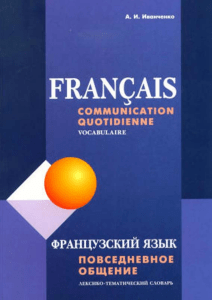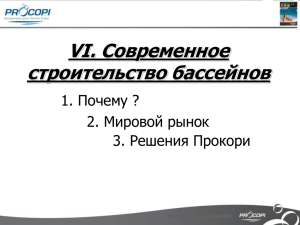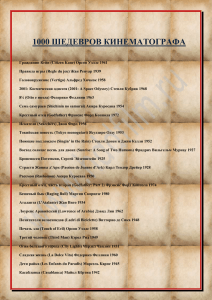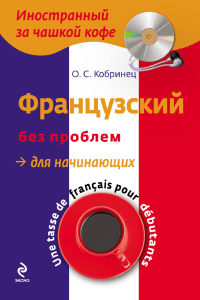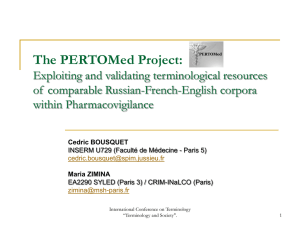Document 2622810
advertisement
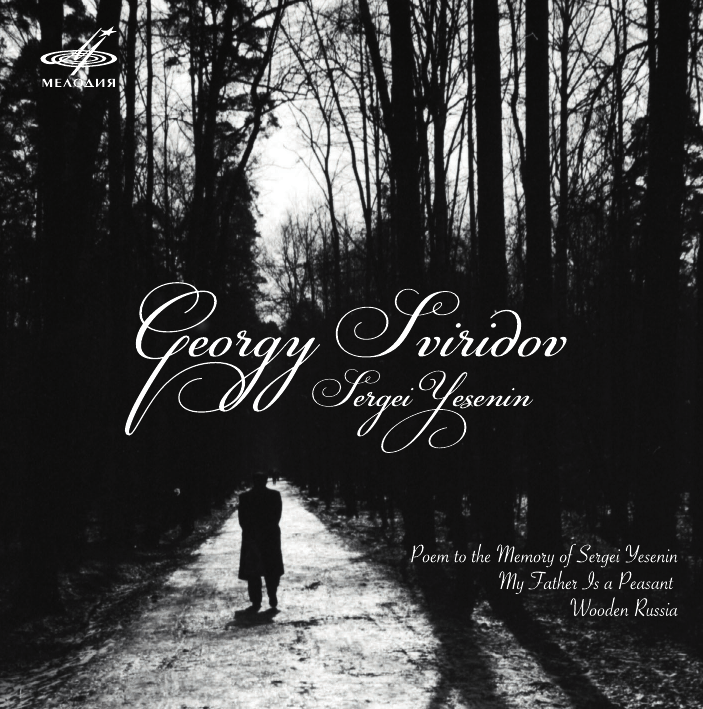
К 100-летию Георгия Свиридова К 120-летию Сергея Есенина 2 «Чувство Родины – основное в моем творчестве» – эти слова Сергея Есенина, «самого русского» поэта, мог бы с полным основанием повторить Георгий Свиридов – выдающийся русский композитор, духовный наследник Глинки, Мусоргского, Бородина, Рахманинова, в музыке которого в каждой ноте звучит «песнь любви вечной России». Георгий Васильевич Свиридов (1915–1998) – воспитанник Ленинградской консерватории, ученик Дмитрия Шостаковича – родился в маленьком городке Фатеж Курской губернии. Быт русской деревни с ее песнями, а также духовная музыка (мальчиком Свиридов пел в церковном хоре) стали основой его искусства. В музыке Свиридова, с необычным для второй половины XX века первостепенным значением мелодии, свободно растворены интонации крестьянской и городской песенности, знаменного распева и духовного стиха. Ведущая в творчестве Свиридова тема Родины трактована очень широко: это история России, ее природа, обычаи, судьба личная и народная, искусство и его этическая роль. Теме Родины сопутствует тема Поэта. Поэт у Свиридова – это богато одаренная натура, глаза и совесть, душа и мысль своего времени, народа. Эти две темы у композитора слились воедино в образе выдающегося русского поэта Сергея Есенина (1895–1925) и сконцентрировались в свиридовской «Поэме памяти Сергея Есенина». По свидетельству самого композитора, Есенина он открыл для себя случайно. Но сколько общего оказалось у обоих художников в их отношении к родине, народной крестьянской жизни, природе. Свиридов своим творчеством опроверг распространенный в то время взгляд на Есенина как чистого лирика, показав его как большого эпического поэта и певца родной земли. На стихи Есенина Свиридов написал множество произведений, последним из которых стала поэма «Отчалившая Русь», созданная в конце 1970-х гг. Первое произведение на стихи Есенина – «Поэма памяти Сергея Есенина» (1955 г.), она составлена из стихотворений и отрывков текстов разных лет. Впечатление от знакомства с произведениями поэта было настолько сильным, что Свиридов сочинил эту многочастную поэму за две недели, «залпом». По ходу работы первоначальный замысел Свиридова о создании камерного цикла романсов для голоса с фортепиано перерос в более масштабное произведение для тенора, хора и симфонического оркестра. Премьера «Поэмы» состоялась 31 мая 1956 г. в Москве в исполнении Алексея Масленникова (тенор), Государственного академического русского хора (под руководством Александра Свешникова) и Большого симфонического оркестра Всесоюзного радио под управлением Евгения Светланова. В «Поэме» нет единого, последовательно развертывающегося сюжета. Каждая из частей – отдельная картина жизни России, вместе они составляют целый микрокосм страны в ее сложный, переломный, революционный период. Внутренняя граница цикла – седьмая часть «1919», разделяющая произведение на две половины – крестьянская Россия до революции и после: «Девятьсот девятнадцатый год – это страшный год в жизни моей семьи, когда погиб мой отец, погиб дед, брат, двое моих дядей. Это были годы гражданской войны, убийственной для русского народа» (Г. Свиридов). Есенин видел гибель русского крестьянства – в девятой части «Я – последний поэт деревни» он, по мнению композитора, поет «отходную молитву, панихиду русской жизни, русской деревне». Но следующую короткую заключительную часть цикла «Небо – как колокол» не следует в свете этого рассматривать в трагическом аспекте: «Такие события, как революции, гражданские войны, слишком большие, их нельзя кончать просто какой-либо похоронной нотой. Это будет ничтожно. Это громадные события, они носят в себе космическое…» (Г. Свиридов). Заключительная часть повествует о бессмертии творчества: «Что сохраняется от жизни, от истории? Сохраняется искусство, оно в себе концентрирует такую 3 4 духовную сущность огромных событий, в которых принимает участие масса людей, оно, это искусство, выражает именно чувства массы людей и одновременно чувства человеческой личности» (Г. Свиридов). «Поэма памяти Сергея Есенина» заняла центральное место в творчестве Свиридова. В ней затронуты мотивы и темы, которые были продолжены в его следующих сочинениях. Вскоре после премьеры «Поэмы памяти Сергея Есенина» Свиридов написал вокальный цикл для тенора и баритона с фортепиано «У меня отец – крестьянин» (1956), расширивший образ Есенина в его творчестве любовной лирикой и темой прощания с юностью. И все же главными остались образ Родины, тема Поэта, дополненные мотивами дороги и прожитой жизни. Жанровые истоки музыкального языка цикла близки «Поэме»: крестьянская лирическая песня и городской романс, частушка и солдатская песня. В вокальный цикл вошли стихотворения Есенина разных лет. Премьера цикла состоялась в Москве в Малом зале консерватории 15 декабря 1957 г. Автор сам аккомпанировал певцам Алексею Масленникову и Евгению Кибкало. (Еще при жизни Свиридова сформировался определенный круг вокалистов, исполнителей его музыки. Среди них Александр Ведерников, Алексей Масленников, Елена Образцова, Евгений Нестеренко, Ирина Архипова, позже – Дмитрий Хворостовский. Часто они выступали в ансамбле с самим автором, тонким интерпретатором не только собственной музыки, но и романсов Глинки, Бородина, Мусоргского). В 1964 г. на стихи Есенина Свиридов написал маленькую кантату «Деревянная Русь» для тенора, мужского хора и симфонического оркестра (также известен и другой вариант сочинения – для тенора с фортепиано). «Маленькая кантата» – разновидность жанра, введенная в русскую музыку Свиридовым. Для этого небольшого четырехчастного цикла Свиридов использовал стихотворения молодого Есенина, уже осознавшего свое творческое признание и рассматривающего свое будущее как трудный и бесстрашный подвиг. Возвышенное восприятие жизни, красоты и величия родной природы сливается с патриотическим чувством искренней привязанности поэта к родной земле. Эта кантата стала образцом так называемой «новой простоты», т.е. сочетания простой музыкальной формы и сложных музыкальных средств, отражающих богатое образное содержание. To the 100th anniversary of Georgy Sviridov To the 120th anniversary of Sergei Yesenin “The sense of Motherland is the main one in my work,” these words of Sergei Yesenin, “the most Russian” poet could be with good reason repeated by Georgy Sviridov, a prominent Russian composer and spiritual heir to Glinka, Mussorgsky, Borodin and Rachmaninoff whose music in each note sang “a song of love for eternal Russia.” Georgy Vasilyevich Sviridov (1915–1998), a graduate of the Leningrad Conservatory and a pupil of Dmitri Shostakovich, was born in the town of Fatezh in the Kursk province. Everyday life of Russian countryside with its songs and holy music (when a boy, Sviridov sang in a church choir) became a basis of his art. Sviridov’s music with a paramount significance of melody, which was so unusual for the second half of the 20th century, freely merged intonations of peasant and urban song traditions, plain chant and holy verse. Sviridov interpreted his leading theme of Motherland in a very broad manner – history of Russia, its nature, customs, his fate and the fate of the people, arts and their ethic role. The theme of Motherland is accompanied by the theme of Poet, a richly gifted nature who is eyes and conscience, soul and thought of his time and people. To Sviridov, all these motifs ran into the art of the outstanding Russian poet Sergei Yesenin (1895–1925) and concentrated in the composer’s Poem to the Memory 5 6 of Sergei Yesenin. According to the composer, he discovered Yesenin’s poetry by accident, but both artists happened to have so much in common in terms of their love for the homeland, life of the people and nature. Sviridov managed to disprove a popular view of Yesenin as a purely lyric poet showing him in his works as a significant epic poet and singer of his native land. Sviridov composed quite a number of works to Yesenin’s poems crowning them with the poem Russia Cast Adrift in the late 1970s. The Poem to the Memory of Sergei Yesenin (1955) was the first composition set to the poetry of Sergei Yesenin and compiled of the poems and extracts of various texts. Sviridov’s impression of the poet’s works was so strong that he wrote this multipart poem for two weeks, all at once. In the course of work, Sviridov’s initial concept of a chamber cycle of romances for voice and piano grew into a more large-scale work for tenor, choir and orchestra. The Poem was premiered on 31 May 1956 in Moscow by Alexei Maslennikov (tenor), the State Academic Russian Choir conducted by Alexander Sveshnikov and the Moscow Radio Symphony Orchestra conducted by Evgeny Svetlanov. The Poem has not any single, sequentially developing plot. Each of the parts is an individual picture of Russian life which jointly make an entire microcosm of the country in its complicated period of revolutionary change. The seventh part “1919” is an inner boundary of the cycle which split the work into two halves – peasant Russia before and after the revolution. “Nineteen nineteen was a terrible year in the life of my family when my father died, my grandfather died, my brother, two of my uncles. Those were the years of the Civil War that was so killing for the Russian people,” Georgy Sviridov said in an interview in 1991. Yesenin saw the demise of the Russian peasantry. In the composer’s opinion, he sings “a prayer for the dying, a pannychida for Russian life, Russian village” in the ninth part “I am the last poet of the village.” But the next short concluding part of the cycle “The sky is like a bell” should not be viewed from the aspect of tragedy: “The events such as revolutions, civil wars are too big and cannot be concluded with any funeral note. That would be negligible. They are enormous events and carry something cosmic in them,” Sviridov believed. The concluding part is about immortality of creative work: “What remains after life and history after all? Art remains as it concentrates certain spiritual essence of the enormous events which involve the masses. It, this art, expresses feelings of the masses and at the same time feelings of a human being.” The Poem to the Memory of Sergei Yesenin took a central place among Sviridov’s works. It touched on the motifs and themes that would be subsequently continued in the composer’s later material. Soon after the premiere of the Poem to the Memory of Sergei Yesenin Sviridov composed a vocal cycle for tenor, baritone and piano My Father is a Peasant (1956) which added the themes of love and coming of age to the image of Yesenin. Still, the image of Motherland, the theme of Poet now amplified with the motifs of road and past life prevailed. The genre roots of the music language of the cycle are very close to the Poem – peasant lyric song and town romance, humorous folk rhyme and soldier’s song. The vocal cycle includes Yesenin’s poems of different years. The cycle was premiered on 15 December 1957 at the Small Hall of the Moscow Conservatory. The composer accompanied the singers Alexei Maslennikov and Evgeny Kibkalo. It should be mentioned that Sviridov collected a certain circle of vocalists to perform his music. Alexander Vedernikov, Alexei Maslennikov, Elena Obraztsova, Evgeny Nesterenko, Irina Arkhipova were among them. The outstanding contemporary singer Dmitri Hvorostovsky also collaborated with the composer. Often they would perform together with the composer, a delicate interpreter of not just his own music but also romances of Glinka, Borodin and Mussorgsky. In 1964, Sviridov wrote a small cantata Wooden Russia to Yesenin’s poetry for tenor, men’s choir and orchestra (another version for tenor and piano is also known). “A small cantata” is a variety that was introduced to Russian music by Sviridov. For this short four-part cycle, Sviridov used poems of young Yesenin when he was already conscious of his artistic calling and viewed his future as a difficult and fearless exploit. An elated perception of life, beauty and grandeur of nature is amalgamated 7 with the poet’s patriotic feeling of sincere affection to his homeland. The cantata became a model of the so-called “new simplicity” when simple music forms are combined with internal complexity and wealth of musical means reflecting a compound content of the images inside the music. A l’occasion du 100ème anniversaire de Gueorgui Sviridov A l’occasion du 120ème anniversaire de Serguei Essenine 8 « Le sentiment de l’amour pour mon pays est au cœur de mon œuvre » – ses paroles de Serge Essenine, le poète « le plus russe », aurait pu répéter à juste titre Gueorgui Sviridov, un grand compositeur russe, successeur spirituel de Glinka, de Moussorgski, de Borodine, de Rachmaninov, chaque note de sa musique étant une manifestation de « la chanson d’amour éternel pour la Russie ». Gueorgui Sviridov (1915–1998), ancien élève du Conservatoire de Leningrad, disciple de Dmitri Chostakovitch, est né dans une petite ville de Fatej dans la région de Koursk. La vie quotidienne de la campagne russe avec ses chansons, ainsi que la musique liturgique (dans son enfance, Sviridov chantait dans le chœur de son église) sont devenues les fondements de son œuvre. La musique de Sviridov accordait la place principale à la mélodie, ce qui était inhabituel pour la deuxième moitié du XXème siècle, elle s’inspirait à la fois des chansons paysannes et urbaines, du chant liturgique et des textes religieux. Le thème patriotique, primordial dans l’œuvre de Sviridov, reçoit une interprétation très large : il s’agit de l’histoire de la Russie, de sa nature, de ses rites, du destin des individus et de celui du peuple, de son art et du rôle éthique de celui-ci. Le thème patriotique est souvent accompagné du thème du Poète, une personne de talent qui est à la fois les yeux et la conscience, l’âme et la pensée de son peuple et de son temps. Pour Sviridov, tous ces motifs ont été réunis dans l’ouvre du grand poète russe Serge Essenine (1895–1925) et ont été concentrés dans le « Poème à la mémoire de Serge Essenine » de Sviridov. Le compositeur racontait qu’il avait découvert l’œuvre de Essenine tout à fait par hasard. Or, les deux artistes avaient beaucoup de choses en commun, en ce qui concerne le rapport à leur pays natal, à la vie des paysans, à la nature. Par son œuvre Sviridov a renversé l’image de Essenine en tant que poète purement lyrique qui était très répandue à l’époque, ayant réussi à le présenter comme un grand poète épique qui chantait son pays natal. Sviridov a créé de nombreuses œuvres sur des textes de Essenine, avant de donner naissance au poème « La Russie à la dérive » à la fin des années 1970. La première œuvre sur des textes de Essenine était le « Poème à la mémoire de Serge Essenine » (1955) composé de poèmes et de fragments de textes écrits par le poète à des années différentes. La découverte des œuvres du poète a tellement marqué Sviridov, qu’il a créé ce poème en plusieurs parties en deux semaines, « d’un trait ». Au cours du travail, le projet initial de Sviridov de créer un cycle de romances de chambre pour voix et piano a évolué en une œuvre monumentale pour ténor, chœur et orchestre symphonique. La première exécution du « Poème » a eu lieu le 31 mai 1956 à Moscou, il a été interprété par Alekseï Maslennikov (ténor), le Chœur académique russe (sous la direction d’Alexandre Svechnikov) et L’orchestre symphonique de la Radio de Moscou sous la direction de Ievgueni Svetlanov. Dans le poème il n’y a pas de sujet unique et cohérent. Chaque partie présente une image distincte de la vie de Russie, mais prises dans leur ensemble, ces images présentent tout un microcosme d’un pays traversant une période complexe et charnière de la Révolution. La ligne séparatrice du cycle se trouve dans la partie n° 7, « 1919 », divisant l’œuvre en deux moitiés – la Russie paysanne avant et après la Révolution : « L’année 1919 était une année atroce dans la vie de ma famille, lorsque mon père, mon grand-père, mon frère, mes deux oncles sont morts. C’étaient les années de la guerre civile, meurtrière pour le peuple russe » (Gueorgui Sviridov, interview de 1991). 9 10 Essenine se rendait compte que le mode de vie paysan est en train de disparaître : dans la partie n° 9 « Je suis le dernier poète de la campagne » il chante, selon le compositeur, « une prière funéraire, une liturgie de funérailles de la vie russe, de la campagne russe ». Mais la partie suivante qui termine le cycle, « Le ciel est comme une cloche » ne doit pas être appréciée sous un angle tragique : « Les événements comme les révolutions, les guerres civiles sont trop importants, il ne faut pas les terminer par une note endeuillée. Ce serait minable. Ces événements sont importants et portent en eux quelque chose de cosmique… » (G. Sviridov). La partie finale est le triomphe de l’art : « Puisque, qu’est-ce qui reste de la vie, de l’histoire ? L’art reste, il concentre en lui l’essence spirituelle des événements majeurs dans lesquels participent les masses, cet art représente précisément les sentiments des masses, mais à la fois les sentiments de chaque individu » (G. Sviridov). Le « Poème à la mémoire de Serge Essenine » occupe la place principale dans l’œuvre de Sviridov. Elle aborde des motifs et des thèmes qui seront par la suite repris dans d’autres œuvres. Peu après la première exécution du « Poème à la mémoire de Serge Essenine » Sviridov a créé un cycle vocal pour ténor et baryton « Mon père est un paysan » (1956) qui a complété le portrait de Essenine dans l’œuvre de Sviridov par des motifs lyriques, ainsi que par le thème de la jeunesse passée. Or, le motif de l’amour pour son pays et le thème du Poète sont restés au cœur de son œuvre, y sont également apparus les motifs du chemin et de l’expérience de la vie. Le langage musical du cycle est inspiré par les mêmes genres que le « Poème » : des chansons lyriques paysannes et des romances nées dans des villes, des chansons grivoises et des chansons des soldats. Le cycle vocal est basé sur des textes de Essenine des années différentes. La première exécution du cycle a eu lieu à Moscou dans la Petite salle du Conservatoire le 15 décembre 1957. L’auteur accompagnait lui-même au piano Alekseï Maslennikov et Ievgueni Kibkalo. Il est à noter qu’encore du vivant de Sviridov s’est formé un cercle de chanteurs qui interprétaient sa musique. Parmi eux, Alexandre Vedernikov, Alekseï Maslennikov, Elena Obraztsova, Ievgueni Nesterenko, Irina Arkhipova, ainsi que Dmitri Hvorostovski, un chanteur remarquable issu d’une génération plus jeune. Souvent ils se produisaient avec l’auteur qui était un très fin interprète non seulement de sa propre musique, mais également des romances de Glinka, Borodine, Moussorgski. En 1964, Sviridov a créé une petite cantate sur des textes de Essenine, intitulée « La Russie en bois » pour ténor, chœur d’hommes et orchestre symphonique (il existe également une autre version de cette œuvre, pour ténor et piano). La « petite cantate » est un genre introduit dans la musique russe par Sviridov. Pour ce petit cycle à quatre parties Sviridov a utilisé des textes du jeune Essenine qui avait déjà pris conscience de son rôle de poète et voyait sa vie future comme un exploit dur et courageux. L’enthousiasme avec lequel le poète chante la vie, la beauté et la grandeur de la nature de son pays se mêle au sentiment du patriotisme et d’un sincère attachement à la terre natale. Cette cantate est un exemple de ce qu’on appelle « la nouvelle simplicité », c’est à dire l’association des formes musicales simples et des moyens d’expression riches et complexes qui laissent apparaître toutes les nuances des images véhiculées par la musique. 11 Георгий Свиридов «Поэма памяти Сергея Есенина» для тенора, хора и симфонического оркестра (сл. С. Есенина) (1955–1956) 1 1. Край ты мой заброшенный . . . . . . . . . . . . . . . . . . . . . . . . . . . . 4.01 2 2. Поет зима . . . . . . . . . . . . . . . . . . . . . . . . . . . . . . . . . . . . . . 4.22 3 3. В том краю . . . . . . . . . . . . . . . . . . . . . . . . . . . . . . . . . . . . . . 4.05 4 4. Молотьба . . . . . . . . . . . . . . . . . . . . . . . . . . . . . . . . . . . . . . . 3.10 5 5. Ночь под Ивана Купала . . . . . . . . . . . . . . . . . . . . . . . . . . . . . . . 4.18 6 6. Ночь под Ивана Купала (продолжение) . . . . . . . . . . . . . . . . . . . . . 3.32 7 7. 1919 . . . . . . . . . . . . . . . . . . . . . . . . . . . . . . . . . . . . . . . . . . 2.38 8 8. Крестьянские ребята . . . . . . . . . . . . . . . . . . . . . . . . . . . . . . . 2.24 9 9. Я – последний поэт деревни . . . . . . . . . . . . . . . . . . . . . . . . . . . . 5.10 10 10. Небо – как колокол . . . . . . . . . . . . . . . . . . . . . . . . . . . . . . . . . 2.36 Георгий Свиридов, фортепиано (11–17) Алексей Масленников, тенор Игорь Морозов, баритон (12, 14–16) Государственная республиканская академическая русская хоровая капелла имени А.А. Юрлова (1–10, 18–21) Симфонический оркестр Ленинградской государственной филармонии Дирижер – Юрий Темирканов (1–10) Большой симфонический оркестр Всесоюзного радио Дирижер – Геннадий Рождественский (18–21) «У меня отец – крестьянин», цикл на стихи С. Есенина для тенора, баритона и фортепиано (1956) 11 1. Сани . . . . . . . . . . . . . . . . . . . . . . . . . . . . . . . . . . . . . . . . . . 1.20 12 2. В сердце светит Русь . . . . . . . . . . . . . . . . . . . . . . . . . . . . . . . . 2.16 13 3. Березка . . . . . . . . . . . . . . . . . . . . . . . . . . . . . . . . . . . . . . . 3.27 14 4. Рекрутá . . . . . . . . . . . . . . . . . . . . . . . . . . . . . . . . . . . . . . . . 1.24 15 5. Песня под тальянку . . . . . . . . . . . . . . . . . . . . . . . . . . . . . . . . 1.39 16 6. Вечером . . . . . . . . . . . . . . . . . . . . . . . . . . . . . . . . . . . . . . . 2.06 17 7. Есть одна хорошая песня у соловушки . . . . . . . . . . . . . . . . . . . . . . 4.47 Ремастеринг – В. Панина-Ободзинская Редактор – Н. Сторчак Дизайн – А. Ким Перевод: Н. Кузнецов (англ.), Н. Рындина (франц.) «Деревянная Русь», маленькая кантата на стихи С. Есенина для тенора, мужского хора и симфонического оркестра (1964) 18 1. Прощай, родная пуща . . . . . . . . . . . . . . . . . . . . . . . . . . . . . . . 0.58 19 2. Топи да болота . . . . . . . . . . . . . . . . . . . . . . . . . . . . . . . . . . . 2.28 20 3. Я странник убогий . . . . . . . . . . . . . . . . . . . . . . . . . . . . . . . . . 2.01 21 4. Не ищи меня ты в Боге . . . . . . . . . . . . . . . . . . . . . . . . . . . . . . 1.30 Общее время: 60.26 Записи: 1957 (1–10), 1980 (11–17), 1970 (18–21) гг. Звукорежиссер – И. Вепринцев Gueorgui Sviridov « Poème à la mémoire de Serge Essenine » pour ténor, choeur et orchestre symphonique (textes de S. Essenine) (1955–1956) 1 1. Mon pays abandonné . . . . . . . . . . . . . . . . . . . . . . . . . . . . . . . . 4.01 2 2. L’hiver chante . . . . . . . . . . . . . . . . . . . . . . . . . . . . . . . . . . . . 4.22 3 3. Au pays . . . . . . . . . . . . . . . . . . . . . . . . . . . . . . . . . . . . . . . . 4.05 4 4. Le battage . . . . . . . . . . . . . . . . . . . . . . . . . . . . . . . . . . . . . . 3.10 5 5. La nuit de Koupala . . . . . . . . . . . . . . . . . . . . . . . . . . . . . . . . . 4.18 6 6. La nuit de Koupala (suite) . . . . . . . . . . . . . . . . . . . . . . . . . . . . . 3.32 7 7. 1919 . . . . . . . . . . . . . . . . . . . . . . . . . . . . . . . . . . . . . . . . . 2.38 8 8. Des enfants paysans . . . . . . . . . . . . . . . . . . . . . . . . . . . . . . . . . 2.24 9 9. Je suis le dernier poète de la campagne . . . . . . . . . . . . . . . . . . . . . . . 5.10 10 10. Le ciel est comme une cloche . . . . . . . . . . . . . . . . . . . . . . . . . . . 2.36 « Mon père est un paysan », cycles sur des textes de S. Essenine pour ténor, baryton et piano (1956) 11 1. Le traineau . . . . . . . . . . . . . . . . . . . . . . . . . . . . . . . . . . . . . . 1.20 12 2. Le cœur est illuminé par la Russie . . . . . . . . . . . . . . . . . . . . . . . . . 2.16 13 3. Le bouleau . . . . . . . . . . . . . . . . . . . . . . . . . . . . . . . . . . . . . . 3.27 14 4. Les recrues . . . . . . . . . . . . . . . . . . . . . . . . . . . . . . . . . . . . . . 1.24 15 5. Une chanson à l’accordéon . . . . . . . . . . . . . . . . . . . . . . . . . . . . . . 1.39 16 6. Le soir . . . . . . . . . . . . . . . . . . . . . . . . . . . . . . . . . . . . . . . . . 2.06 17 7. Il y a une bonne chanson de rossignol . . . . . . . . . . . . . . . . . . . . . . . 4.47 « La Russie en bois », une petite cantate sur des textes de S. Essenine pour ténor, chœur d’hommes et orchestre symphonique (1964) 18 1. Adieu, ma forêt natale . . . . . . . . . . . . . . . . . . . . . . . . . . . . . . . . 0.58 19 2. Les marais et les bourbiers . . . . . . . . . . . . . . . . . . . . . . . . . . . . . 2.28 20 3. Je suis un pauvre vagabond . . . . . . . . . . . . . . . . . . . . . . . . . . . . . 2.01 21 4. Ne me cherche pas dans le Dieu . . . . . . . . . . . . . . . . . . . . . . . . . . 1.30 Durée totale : 60.26 Gueorgui Sviridov, piano (11–17) Alekseï Maslennikov, ténor Igor Morozov, baryton (12, 14–16) Capella Alexandre Yourlov (1–10, 18–21) Orchestre philharmonique de Leningrad Chef d’orchestre – Iouri Temirkanov (1–10) L’orchestre symphonique de la Radio de Moscou Chef d’orchestre – Guennadi Rojdestvenski (18–21) Enregistrements effectués en 1957 (1–10), en 1980 (11–17) et en 1970 (18–21). Remastering – V. Panina-Obodzinskaya Rédactrice – N. Stortchak Design – A. Kim Traduction : N. Kouznetsov (angl.), N. Ryndina (fr.)
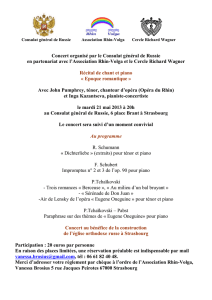
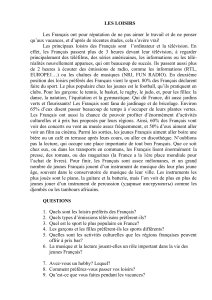

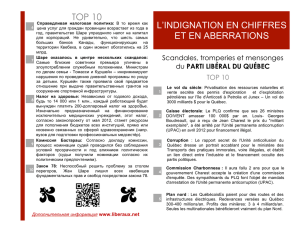
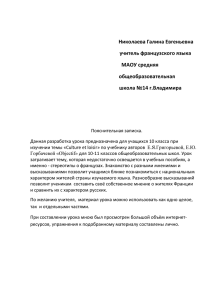
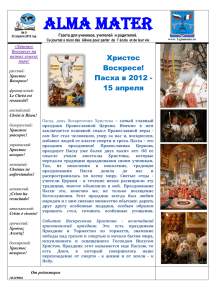
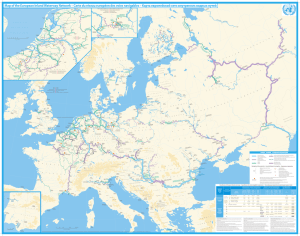
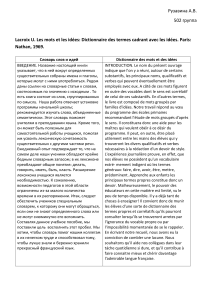
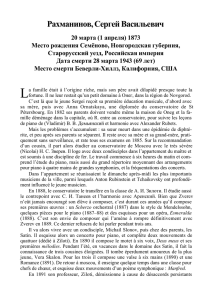
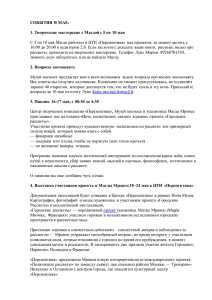
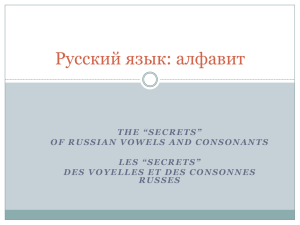
![[Centre-FR] Selection internationale de l`ENS](http://s1.studylib.ru/store/data/003874290_1-48f8795fb6474fd88de09b3890da2c6d-300x300.png)


